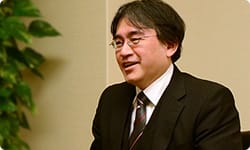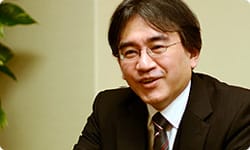Expedition into Other Towns to Challenge People Better than Us
How did you get involved with video games, Ikeda-san?
Yeah, I'm Kohei Ikeda, the producer of this game. I first encountered video games when I was in first grade. The Super Mario Bros.6 game was released, and I threw a fit and got my parents to buy it for me. But we didn't have a two-prong VHF converter, so I remember I went by myself to buy one. 6. Super Mario Bros.: An action game released for the Nintendo Entertainment System in September 1985.
You went to that much trouble, as a first grader?
Yes. I did have some help, but I remember the moment I got it hooked up to our old TV, I was so excited, I yelled "Oh, great!" It made such an impact on me to be moving the Mario that was on my TV screen.
It was back then that many people first experienced being able to move something on the screen with something in their hands.
Right. That's how I started to like video games. I started playing against my friends in the neighborhood, and it was so much fun making the characters move the way I wanted them to. When I was in sixth grade a friend of mine invited me to the video game section at the department store, and we went to play Street Fighter II7. The idea of facing each other and competing was so new. 7. Street Fighter II: A fighting game released as an arcade game from CAPCOM Co., Ltd. in 1991.
It was a very unique experience, competing against a stranger.
Yes. I gathered around the people who were playing and watched them with my arms crossed. If you won you got to keep playing, so I wanted to get really good, and it was such a new feeling communicating with a stranger through a video game.
I feel like the rule that the person who won would stay and the person who lost had to switch out is something that sprung up naturally.
That's right. When I started going to game arcades as a middle schooler, the game arcade itself was such an exciting place where you could experience something cutting edge It was around the time that Virtua Fighter 28 came out that I really got into fighting games. I was still in middle school, but I practiced a lot, so I was able to beat adults in their twenties and even forties. 8. Virtua Fighter 2: A fighting game that came out as an arcade game from SEGA Corporation in 1994.
A middle schooler beats an adult in video games.
That's right. So we got to know each other, and we went out to eat, or chatted and I was just having so much fun... After a while the conversation turned to "Hey, there might be people better than us in other towns, let's go see!" and on the weekends I'd go on fieldtrips with them in their cars.
That's amazing! You went on expeditions to other towns? (laughs)
Yes. That experience really made me who I am now. It was such a new experience being able to connect with people I didn't know. Also, when we got information that someone good was coming, we would wait for them like, "Okay then, let's meet at the game arcade at this time on this day!" (laughs)
Oh, a duel? You went and challenged everyone, as in martial arts?
Yes, but I lost about 30 games in a row. (laughs) But after that, people told me, "You'll get better if you do this," or "Try this, it's cool." I was able to communicate with people directly. That's the best part of fighting game, and it made me love game arcades, too. I wanted to be involved in that somehow.
Expeditions into other towns, challenging everyone... You really did grow up with fighting games.
Having games like that in middle school is just so exciting, you just can't stop yourself.
Yes, I couldn't stop myself. (laughs) After I graduated from high school, the era of 3D being the center of video games was coming, so I went to a vocational school for video games to study 3D graphics and motion. At the time, I was hooked on the Virtua Fighter series, and there was this famous game arcade in the city called Machida, so I rented a place there.
What? You decided to live in Machida because there was a game arcade there?
That's right. (laughs) Although I didn't tell my parents that.
Fighting games were the biggest priority in your life. (laughs)
It was a famous game arcade, so all kinds of people came there, and I had so much fun every day. I had done a part time job at Enterbrain9 recording combos10 for Tekken, and after I graduated from the vocational school, that experience led me to land a job there. I worked there for about six years as the director of a magazine that came with a DVD called Monthly Famitsu Wave11, doing direction of planning and video.
9. Enterbrain, Inc.: Headquarters in Chiyoda Ward, Tokyo.
10. Combo: Combination moves found in fighting games. In the Tekken series players can use up to ten moves in series by pressing the buttons in the right order.
11. Monthly Famitsu Wave: A monthly game magazine that came with a DVD, it was published by Enterbrain, Inc. The magazine was in circulation between 1998 to 2011.
So much about the showing the magic of video games is determined by the images.
Yes. I was able to work from the viewpoint of how to make something interesting for the people playing it, so I think I really put those experiences to use now.
Did you meet Harada-san while you were working on Monthly Famitsu Wave?
Yes. I actually did an interview with him once. Also, I loved Tekken, so I did a project called Tekken: Defeat 100 Enemies to try and drum up interest in Tekken. I rolled the dice to see which stops on the Yamanote line I'd get off on and spent two hours in each game arcade, trying to see if I could win 100 games in a day.
So you'd play against people who just happened to be there?
Yes. It was all real, I went to the game arcade and played against them.
That video was hilarious. Everyone in the dev team were all cracking up as we watched it.
I heard about that afterwards and it made me so happy.
Whether it's the expedition you talked about earlier, or the duels, it's so full of human drama. The two of you both seem to love playing so much that your real motive is wanting to find people who understand that. The two of you... are very much alike. (laughs)
Hearing him talk, we do seem to have a lot in common.
So Ikeda-san, how did you end up having a connection to the Tekken team?
When we made the DVD for Tekken 512, we had an idea to have famous players from Japan and South Korea face off. So we went to a game arcade in South Korea. It was three players representing South Korea, three players representing Japan, and over 60 South Korean spectators, and that's where we filmed. You can say that we were definitely not on our home turf. 12. Tekken 5: A fighting game released in November 2004 as an arcade game and as a home console game in March 2005.
Like you pushed into enemy territory.
Exactly. I remember the air was very tense during the tournament, just like the Japan x South Korea soccer and baseball matches. But after the tournament, we felt really close, so we went out to eat with them and played Tekken at the arcade. Even though we didn't speak each other's languages, I realized then that fighting games are like sports in that the whole world can communicate through them. Around then, NAMCO happened to be looking for mid-career hires for their Tekken project, so I applied. I felt like all of my projects and my expedition to South Korea were all connected to Tekken.




